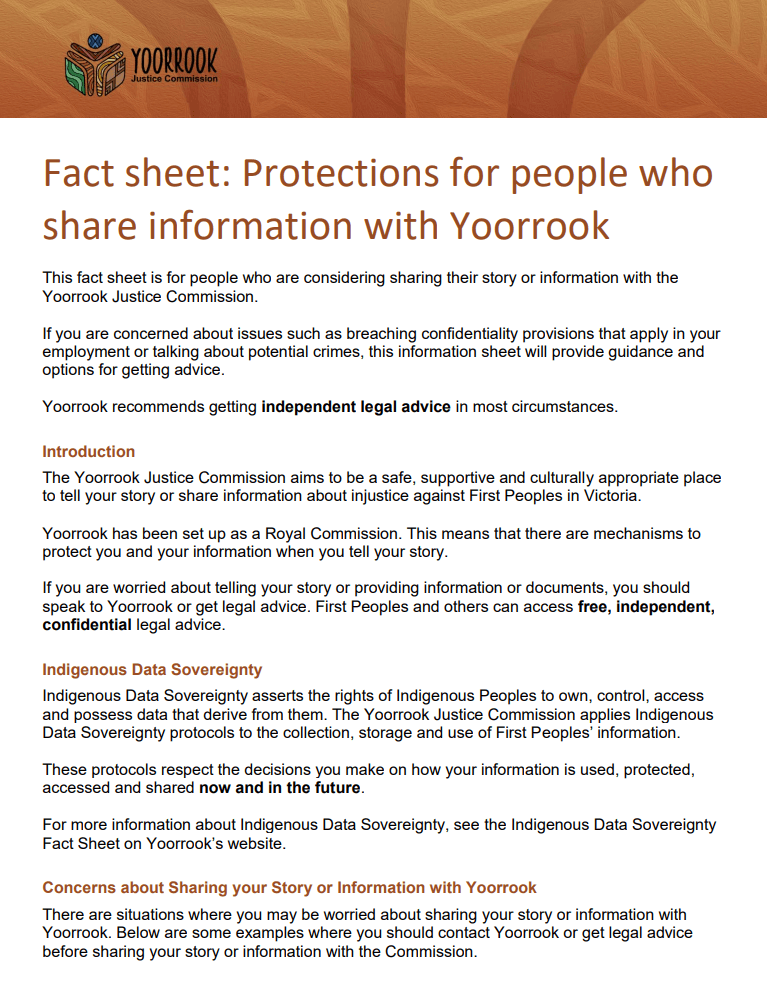Protections for people who share information with Yoorrook
This fact sheet is for people who are considering sharing their story or information with the Yoorrook Justice Commission.
If you are concerned about issues such as breaching confidentiality provisions that apply in your employment or talking about potential crimes, this information sheet will provide guidance and options for getting advice.
Yoorrook recommends getting independent legal advice in most circumstances.
The Yoorrook Justice Commission aims to be a safe, supportive and culturally appropriate place to tell your story or share information about injustice against First Peoples in Victoria.
Yoorrook has been set up as a Royal Commission. This means that there are mechanisms to protect you and your information when you tell your story.
If you are worried about telling your story or providing information or documents, you should speak to Yoorrook or get legal advice. First Peoples and others can access free, independent, confidential legal advice.
Indigenous Data Sovereignty
Indigenous Data Sovereignty asserts the rights of Indigenous Peoples to own, control, access and possess data that derive from them. The Yoorrook Justice Commission applies Indigenous Data Sovereignty protocols to the collection, storage and use of First Peoples’ information.
These protocols respect the decisions you make on how your information is used, protected, accessed and shared now and in the future.
For more information about Indigenous Data Sovereignty, see the Indigenous Data Sovereignty Fact Sheet on Yoorrook’s website.
Concerns about Sharing your Story or Information with Yoorrook
Example 1: Whistleblowing - Confidentiality in employment or speaking up about wrongdoing you have seen in your work
Example 2: Culturally or personally sensitive information
Example 3: Talking about court cases
Example 4: Talking about crimes
Example 5: Criticising other people and defamation
Example 6: Risks of being targeted, treated badly or reprisals against you if you share information
Example 7: Confidentiality and settlement agreements
You want to share information but you have made a legal agreement with a person or
organisation not to share the information.
Example 8: Secrecy laws or other confidentiality laws
Ways that Yoorrook can Protect you and your Information
There are a number of ways that Yoorrook can protect you and your information including:
- You can share information confidentially with Yoorrook.
- You can share information with Yoorrook anonymously.
- Yoorrook can make orders restricting access to information you choose to share.
- There are legal protections for people sharing information with Yoorrook that limit how others might use that information against you.
- Yoorrook can take steps, such as giving you a notice to produce information or a notice to attend a Yoorrook hearing, that give you certain legal protections about sharing information with Yoorrook. For example, Yoorrook can take steps to protect you if you share information with Yoorrook that is covered by employment confidentiality obligations.
- There are legal protections to stop employers from taking action against workers if they share information with Yoorrook.
- You can give evidence in confidence or at a closed hearing.
If needed, Yoorrook can do additional things or combine some of these options to make sure you and your information are protected.
The way these protections work will vary depending on your individual circumstances. That’s why it is important to get legal advice on your situation.
You should get Legal Advice if you have Concerns
First Peoples can obtain free and confidential legal information, advice and support from Lotjpa Independent Legal Service. This service is independent from Yoorrook. The Victorian Aboriginal Legal Service and Victoria Legal Aid run this service.
In certain cases, non-First Peoples can also access free and independent legal support to tell their story or share information with Yoorrook:
- Lotjpa can assist non-First Peoples whose Yoorrook issue relates to a First Peoples’
family member. - The Human Rights Law Centre can assist non-First Peoples whose Yoorrook issue
relates to confidentiality obligations due to past or ongoing employment.
Please contact Lotjpa (Victoria Legal Aid) on:
Phone: (03) 8610 9830 (open from 10 am to 5 pm, Monday – Thursday)
Email: [email protected]
Or Lotjpa (Victorian Aboriginal Legal Service) on:
Phone: (03) 9418 5999 (open from 9 am to 5 pm, Monday – Friday)
Email: [email protected]
The Human Rights Law Centre can be contacted at:
Email: [email protected]
Or you can contact Yoorrook directly to discuss your options by calling 1800 966 775 or emailing [email protected]
More information about legal support is available at
https://yoorrookjusticecommission.org.au/legal-support/
What happens to my Information during Yoorrook?
Yoorrook will use the information it receives as evidence to report on systemic injustices against First Peoples in the State of Victoria since the start of colonisation. This evidence will be used to make findings and recommendations for change and will also form an official public record of First Peoples’ experiences of systemic injustice.
While Yoorrook is running, your information:
- will be stored securely on Yoorrook’s databases;
- will only be accessible to Yoorrook Commissioners, staff, contractors and legal team who all have legal obligations to keep the information confidential;
- will be carefully managed in accordance with your choices about who can use, publish and access the information;
- cannot be accessed under the Freedom of Information Act 1982.
What happens to my Information after Yoorrook is Finished?
Under current laws, once Yoorrook is finished, all the information collected (the ‘archive’) will be sent to the Public Records Office of Victoria. Protections can be put in place to limit access to your archived material.
If you have concerns over your archived material, it is important to get legal advice.
Yoorrook is currently asking the government to change the law so that First Peoples have more choice and control over how the information they give to Yoorrook will be stored, accessed and used in the future.

